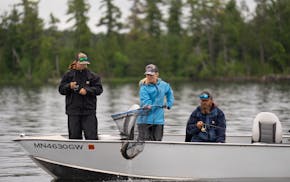Sara Lofgren thought at first there was something wrong with her water softener. Dirty gray water, thick with sediment, started coming out of her faucets in December. Her home uses a private well a few miles north of Elko New Market. She filled a bathtub with the murky water, snapped a picture and called a plumber.
Lofgren had to install a reverse osmosis system, replace iron filters and flush the sediment and manganese out of her well tank at a total cost of about $6,000.
Lofgren didn't know it then, but more than a dozen of her neighbors said they were having the same problem. One's water had turned yellow from stirred-up rust. Another's started to smell. Several had to replace filters that were clogged with dark slime. Another found a black sandlike substance that was soft to the touch had built up in his toilet tank, staining it.
The homeowners, all on private wells, now believe they know what caused the problem. The city of Elko New Market ran an aquifer test, because it wants to drastically increase the amount of water it draws each year to supply a new bottled water plant. The test required the city to pump higher than normal amounts of groundwater for 30 days in November and December to see if the water supply could handle it.
That extra pumping seems to have stirred up manganese, which discolors water and is harmful to drink in high quantities, said Carrie Jennings, who was a field geologist for the Minnesota Geological Survey for more than 20 years and is now policy director for the nonprofit Freshwater Society.
The problems mostly went away as soon as the city finished the test in December. But the extra pumping is likely to return if or when state regulators approve the city's water permit amendment.
"The question now is: Is this going to be what the water quality is going forward?" she said.
Elko New Market, a small but fast-growing Twin Cities suburb in Scott County, uses about 125 million gallons of water a year. The City Council last year offered more than $3 million in subsidies to California-based Niagara Bottling, which sells bottled water to Walmart and Costco, to open a plant in Elko New Market. The company plans to eventually draw 310 million gallons of city water a year to bottle, ship and sell across the country.
The city has applied for an amendment to its water permit from the Minnesota Department of Natural Resources to allow it to pump the additional water. The agency has not made a decision yet on whether to allow the increase, and ordered the pump test to find out if doing so would hurt other well owners, affect surface waters and be sustainable long term.
The DNR received 22 complaints from well owners following the test and is evaluating them, agency spokesman Erik Evans said. The agency has been talking with city leaders about the issues, he said.
"Any permit amendment, if approved, would need to include conditions to monitor and address potential well interference or water quality complaints," he said.
Evans said the agency expects to make a decision on the permit amendment in the coming weeks.
The DNR has seen temporary water quality issues arise from aquifer tests in the past.
Ellen Considine, a hydrologist supervisor with the DNR, said in an April email to concerned residents the agency believes the issues happen when the change in water flow causes temporary changes inside individual wells and not to the aquifer at large.
"I would expect water quality to go back to normal now that the aquifer test is over," she wrote. "I don't know whether this will happen again in future."
City Administrator Thomas Terry said Elko New Market is working out a response plan with the DNR that will lay out how it will investigate complaints and correct any problems caused by the city's pumping.
"Each circumstance is different, and they would all be evaluated individually based on the specifics in each concern that's raised," he said.
Some of the homeowners who experienced problems have been organizing opposition to the plant, worried about what the water use will do to their wells.
Jonathan and Jami Carlson lost all their white clothes, which were dyed gray by the manganese that seeped into their water during the aquifer test. They had to rip out their sediment-stained toilet. And they had to replace their water softener with a new six-tank system that will cost them more than $160 a month for the foreseeable future.
The frustrating thing is that most of the homeowners affected by the test live in New Market Township, not the city, so they can't vote for the mayor or City Council who control the water plant, Jonathan Carlson said.
"We just have no confidence that the DNR is going to protect the groundwater," he said. "The company has already started grading the site for the plant, so it seems like Niagara, at least, thinks it's foregone conclusion that the city is going to get this increase."
Janelle Kuznia and her husband have lived in their house 25 years. Their water has a high amount of iron, so they replace the filter in their system every three months. In December, their filter was covered in a gray slime, dirtier than it had ever been.
When they replaced the filter again in March, the water seemed back to normal, she said.
She isn't sure what she is supposed to do if the city starts drawing high amounts of water again.
"Do I need to increase my filtration system?" she asked. "We know there's manganese and arsenic in the water around here. Should I test for it every month? Change my filter every month?"

Why now might be the best time to make a deal on boats, ATVs and other powersports
Lupine is starting to bloom in Minnesota. Here's where to find it.

Xcel lets loose a small army of hungry sheep to keep its solar farm in order

Anderson: In early June, Minnesota fish are begging to be caught. Won't you help?
